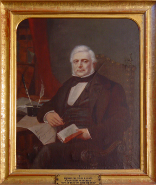U.Porto Memory
Grand Hall of the University of Porto - Portrait Gallery
| Manuel da Silva Passos Founder of the Polytechnic Academy of Porto and a liberal Portrait by Francisco José Resende |
 |
||
Biography of Manuel da Silva Passos (Passos Manuel, 1805-1862)
"When I'm less enlightened and have an opinion, and then follow another opinion, there is a contradiction in this: but this contradiction always honours the man who changes opinion (Hear! Hear!). At 47, I have to have more experience and know more than when I was 20: time should not be in vain for the public man. If he cannot change opinion, then there is no point in discussion."
Passos Manuel, A sitting at the House of Representatives on 19 March 1852.
Manuel da Silva Passos was born on 5 January 1805 in S. Martinho de Guifões, in the former jurisdiction of Bouças, today Matosinhos municipality. He was the son of Manuel da Silva Passos, a farmer with business at the General Company of Agriculture and Upper Douro Vineyards and stores in Porto, and of Antónia Maria da Silva Passos, and brother to José da Silva Passos (1802-1863), known as Passos José. He was baptized on 13 January 1805, and his godparents were Manuel José Fernandes and Genoveva, wife of Luís Manuel Teixeira de Carvalho.
In 1817, he enrolled in Canons and Laws along with his brother at the University of Coimbra. In 1821, he passed Canons in the 4th year and Laws in the 3rd year.
In 1823, along with his brother he founded the liberal newspaper entitled "O Amigo do Povo", with only 4 editions and a supplement. On 1 August 1826, the periodical "Borboleta Constitucional" published his song "Constitutional Song of Vila Nova de Gaia", to be sung at the oath to the Constitutional Charter. In 1828, he was one of the exiled liberals who accompanied the withdrawal of the liberal army to Galicia, and then to Plymouth.
EIn 1830, the brothers Manuel and José Passos were in France and published the brochures "Second revolution and the Triumph of Freedom in France" (anonymous), "Brief reasoning in favour of Lusitanian Freedom and of her Excellency D. Maria II", "Opinion of two lawyers of the House of Porto", "Examination of some opinions", a flyer refuting the claims of General Delaborde on the Portuguese, and "Memorial on the need and way to destroy the tyrant of Portugal". Since 1831, both brothers received a subsidy from the French Government, intended for immigrants.
Between 1832 and 1850, Manuel Passos, who had been introduced to the freemasonry lodge of "Arco da Almedina" under the symbolic name of Howard, became the Grand Master of Northern Freemasonry in Portugal.
In August 1832, he left France to fight in the Siege of Porto. In 1834 he was elected parliament member and again opposed the regency of D. Pedro, and assumed the leadership of the Northern Freemasonry. In the following year, he shunned from parliamentary radicals and in 1836 led the September Revolution.
During the reign of D. Maria II (1819-1853), he was Minister of the Kingdom in the 6th and 7th Constitutional Government (10 September 1836 and 1 June 1837), a post he held along with Treasury in the second government (6 November 1836 to 10 May 1837, when he asked to resign). He was also Minister of Ecclesiastical Affairs and Justice.
Following the reorganisation of the Portuguese society, carried out by José Xavier Mouzinho da Silveira (1780-1849), he sought to renew the educational, cultural and administrative systems. With regard to education, he was responsible for creating high schools, reorganizing education at the University of Coimbra and the reform of the Medical-Surgical Schools of Porto and Lisbon (1836). He established the Polytechnic School of Lisbon, converted the Royal Academy of Maritime and Trade Affairs of the City of Porto at the Polytechnic Academy of Porto by decree of 13 January 1837, and set up the conservatories of Arts and Crafts in Lisbon (1836) and Porto (1837), the General Conservatory of Performing Arts (1836) and the Porto Academy of Fine Arts (1836).
He was elected parliament member representing Porto on 20 November 1836, and held this post after he left the Government and until 4 April 1838.
In that year, he married Gervásia Joaquina Farinha de Sousa Falcão. He then became a farmer and bought a house in Alcáçova de Santarém (1841). In the following years, he was a senator and parliament member, proclaimed representative member of Goa, took his seat in Parliament (1843) and on 18 October 1844 gave a speech which was published in the election campaign the following year. In 1846, during the popular uprising of Maria da Fonte, he chaired the Regional Board of Santarém and Estremadura. On 29 June 1847, he signed the Gramido Convention.
He died in Santarém on 16 or 17 January 1862, and he will go down in history as one of the most prominent men of 19th century liberalism.
Universidade Digital / Gestão de Informação, 2012. Scientific Review by Jorge Fernandes Alves (FLUP)
Last updated: 2016-07-07 Webpage created on: 2025-06-21 02:51:55 Complaint Portal